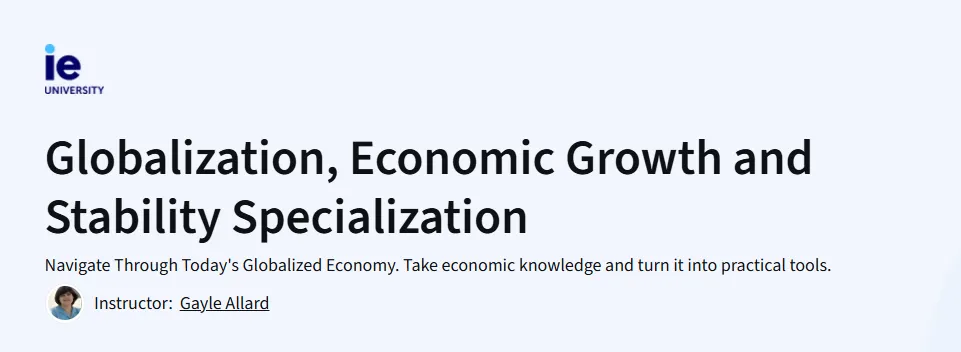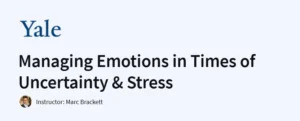What will you learn in Globalization, Economic Growth and Stability Specialization Course
Explore how globalization influences global trade, finance, and international institutions.
Understand the factors driving long-term economic growth and the economic consequences of financial crises.
Evaluate the role of international policies in shaping stable, resilient economies.
Apply macroeconomic frameworks to interpret real-world global economic dynamics.
Program Overview
Course 1: Globalization
⏱️ 3 weeks
Topics: History and trends of globalization, global trade and labor markets, multinational corporations.
Hands-on: Analyze global economic data, trade scenarios, and the role of international institutions.
Course 2: The Economics of Globalization
⏱️ 3 weeks
Topics: International trade theories, comparative advantage, trade policy, exchange rates.
Hands-on: Interactive simulations on tariffs and trade impacts; case studies on trade agreements.
Course 3: Economic Growth
⏱️ 4 weeks
Topics: Growth models, capital accumulation, productivity, innovation, and institutions.
Hands-on: Assess real-world growth indicators and interpret growth trends in developed vs. emerging economies.
Course 4: Financial Crises
⏱️ 4 weeks
Topics: Causes of financial crises, banking systems, regulatory responses, case studies (2008 crisis, others).
Hands-on: Analyze past crises through macroeconomic models and review crisis management tools.
Get certificate
Job Outlook
Growing demand for professionals with expertise in global economic dynamics and risk analysis.
Career paths in international development, global finance, policy advising, trade economics, and research.
High relevance for roles in multinational corporations, NGOs, and governmental agencies.
Specification: Globalization, Economic Growth and Stability Specialization
|
FAQs
- No prior economics or finance background needed.
- Covers globalization, trade, growth, and financial stability.
- Suitable for students, professionals, and policy enthusiasts.
- Focuses on conceptual understanding with practical examples.
- Includes interactive exercises analyzing global economic data.
- Explore historical and current trends in globalization.
- Understand the impact of multinational corporations on economies.
- Learn trade theories, exchange rates, and trade policy.
- Analyze real-world case studies of global economic interactions.
- Evaluate the influence of international policies on national economies.
- Study growth models, productivity, and capital accumulation.
- Understand innovation and institutional impacts on growth.
- Analyze causes and consequences of financial crises.
- Review case studies like the 2008 global financial crisis.
- Learn tools for macroeconomic analysis and crisis management.
- Prepares for careers in international development, finance, and policy advisory.
- Builds skills in global economic analysis and risk assessment.
- Useful for roles in NGOs, government agencies, and multinational corporations.
- Enhances analytical and strategic decision-making skills.
- Certificate validates understanding of global economic systems.
- 4 courses: Globalization (3 weeks), Economics of Globalization (3 weeks), Economic Growth (4 weeks), Financial Crises (4 weeks).
- Each course: 3–4 weeks at a moderate pace.
- Self-paced with lifetime access.
- Includes hands-on simulations and case studies in every course.
- Total duration: ~14 weeks.





